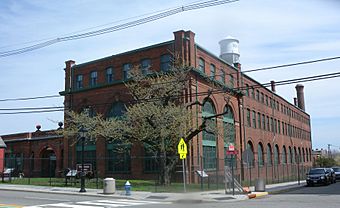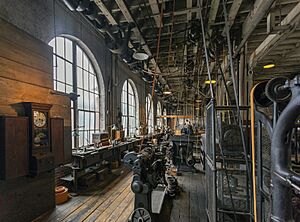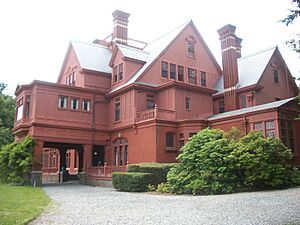Thomas Edison National Historical Park facts for kids
|
Thomas Edison National Historical Park
|
|

Thomas Edison's Laboratory
|
|
| Location | 211 Main Street, West Orange, NJ 07052 |
|---|---|
| Area | 21.25 acres (8.60 ha) |
| Built | 1887 |
| Architect | H. Hudson Holly |
| Architectural style | Late Victorian, Queen Anne |
| Website | Thomas Edison National Historical Park |
| NRHP reference No. | 66000052 |
Quick facts for kids Significant dates |
|
| Added to NRHP | October 15, 1966 |
| Designated NHP | September 5, 1962 (as NHS, redesignated NHP March 30, 2009) |
The Thomas Edison National Historical Park is a special place in West Orange, New Jersey, United States. It protects the amazing laboratory and home of the famous inventor, Thomas Edison. His home, called Glenmont, and the laboratory were designed in 1887. For over 40 years, Edison's team worked here, creating incredible inventions. They developed the first motion picture camera, better phonographs (for playing sound), sound recordings, movies (both silent and with sound), and even a special type of battery.
Contents
Exploring Edison's Amazing Inventions
The park has two main parts in West Orange: the large Edison Laboratories complex and Edison's beautiful home, Glenmont. His home is located in Llewellyn Park, about half a mile (0.8 km) west of the lab.
The Laboratory Complex
The laboratory complex was built by Edison in 1887. It was a huge workshop where he and his team worked on new ideas. This complex had over a dozen buildings! They researched many things like electricity, photography, movies, and chemistry. There was even a special library and workshops to build tools and test new inventions.
One very famous building was Edison's Black Maria. This was the world's very first movie studio! It could even spin around to catch the best sunlight for filming. A copy of the Black Maria was built in 1954 so visitors can see what it looked like.
Edison's Home: Glenmont
Edison's home, Glenmont, is a beautiful house built in the Queen Anne style. It was designed by Henry Hudson Holly between 1880 and 1882. The house originally had 23 rooms! It was very modern for its time, with central heating, indoor bathrooms, and running hot and cold water.
Thomas Edison bought Glenmont in 1886. He moved in with his second wife, Mina, and his three children from his first marriage. The house still has many of its original furniture pieces. Edison later added six more rooms and, of course, installed his own electrical wiring!
Edison and Mina had more children who grew up at Glenmont. Some of them became famous, like Charles Edison, who later became the governor of New Jersey, and Theodore Miller Edison, who was also an inventor and businessman.
A Look Back at History
Edison's home and laboratory became important historical sites over time. His home was first recognized as a National Historic Site in 1955. The laboratory became a National Monument in 1956.
Then, in 1962, both the home and the lab were combined into the Edison National Historic Site. This site covers about 21 acres (8.5 hectares). On March 30, 2009, its name changed to the Thomas Edison National Historical Park. The name "Thomas" was added to help people know it was about the famous inventor, not just any place named Edison. After many updates, the laboratory complex had a grand reopening on October 10, 2009.
More to Discover
- Edison State Park
- Edison Storage Battery Company Building
- Thomas Alva Edison Memorial Tower and Museum
- National Register of Historic Places listings in Essex County, New Jersey
- List of museums in New Jersey




